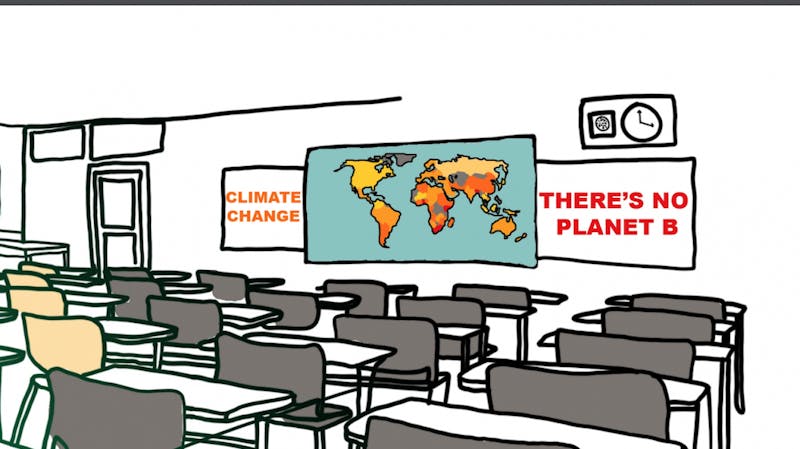

Climate change and environmentally-conscious living are just a couple of the topics that are increasingly discussed in a variety of settings, ranging from elementary schools to international political conferences.
While most colleges that are part of the UW System offer classes in environmental science, different professors and their expertise cover these topics differently.
Since climate change has become a highly politicized issue, students in environmental studies classes are often taught that it is a real and present phenomenon — and are provided scientific data to prove this.
“Students are free to have own beliefs, but they are expected to learn material presented to them,” UW-Madison professor Jack Williams, who teaches various courses on climate change and geography, said. “There are present lines of evidence that temperatures are rising and that there’s a human causation, but students are free to come up with their own conclusions about how to interpret that material.”
When Williams began teaching a climate change course in 2007, he estimated that about 25 percent of the class was skeptical about the reality of climate change; he believes that number is now around one percent.
Similarly, UW-Milwaukee professor Mai Phillips, a coordinator for the conservation and environmental science program, said she finds students don’t question if climate change is real or not, but rather are curious about what solutions are most effective for stopping it.
“I do teach that climate change is a real and present issue; it is part of my course syllabus,” she said. “In my course, what we try to instill in the students is that individuals can do a lot — and actually that’s where you’ll be most effective.”
Due to the scientific data that climate change presents and the worsening state of the environment, the issue can become politicized in courses because of how relevant it is in diplomacy today.
“It’s hard to teach about climate change without encouraging your students to take a stance on it,” said Morgan Robinson, a UW-Madison environmental studies program teaching assistant.
Because professors are generally fairly free to decide how to run their course, some choose to make the divided politics of climate change debate a focus of the class.
For example, in the UW-Madison Climate Change Governance course, students are required to create an “advocacy project” where they select a specific aspect of climate change and design a proposal to help mitigate this issue.
“I know that professors are not supposed to take a politically-biased stance, but it’s hard not to when teaching about climate change — it’s clear that many people on one side of the political spectrum do not believe in the issue and some are actively working against efforts to mitigate or even adapt to climate change,” Robinson said.
Other professors, however, try to focus more strictly on the scientific causes and data related to climate change.
“People come in with different perspectives; the goal in all courses is to present the facts and credible knowledge and then let students go from there in terms of action,” Williams said. “If resources come up [about the topic], I will share them, but it’s not an emphasis of the course.”
In addition to professors taking different approaches to environmental studies classes, the UW System schools also have different requirements for their majors.
At UW-Madison, a student must complete another major along with the environmental sciences major so that they are able to apply their environmental knowledge to another, more broader area of focus.
UW-Milwaukee does not have this same requirement, however students majoring in environmental studies must choose between the conservation and natural resources or the water resources track.
An ecological and environmental biology major at UW-Eau Claire is offered, rather than environmental science, although students can complete a minor in the subject. At UW-La Crosse, environmental studies is only available as a minor.
While the administration does not take a System-wide stance on climate change, there are many programs and research being done on various campuses about environmental issues.
At UW-Madison, climate change and sustainability efforts are not necessarily coordinated at the administrative level. However, there is lab work alongside many grassroots movements surrounding the topic, including the launch of the Great Lakes Bioenergy Institute, Center for Climatic Research, Center for Sustainability and Global Environment, Williams said.
Despite the ongoing research on campus, there is still room for improvement in terms of how environmentally-conscious UW System is as a whole, especially when it comes to educating students who are not necessarily exposed to environmental studies courses.
“I think that a cool way to educate students about environmental issues would be a small environmental education session during floor meetings freshman year hosted by house fellows,” Sofia Weinstein, a UW-Madison freshman and member of Rethink Wisconsin and Free Salad, said. “They should highlight the small ways each individual can reduce their carbon footprint to make the task less daunting.”
Though environmental studies professors in the UW System are given relative freedom in terms of how they approach the topic of climate change and sustainability in the classroom, they tend to agree that the System does a good job of promoting environmental consciousness.
“In general, UW-Madison as flagship university has a really important role to play in training the next generation of leaders, finding solutions to climate change and sharing with state at large,” Williams said.